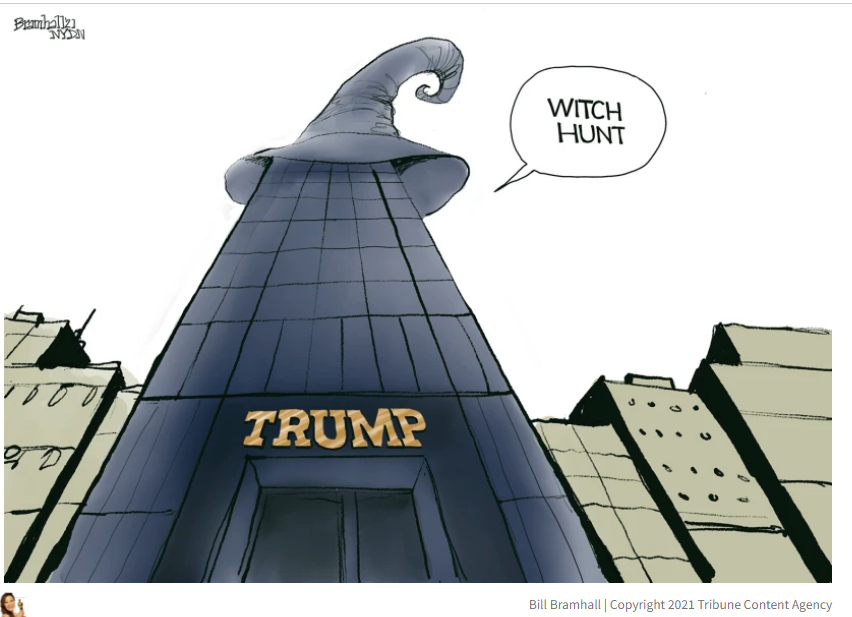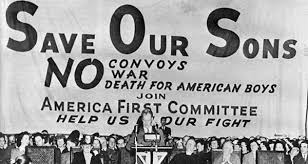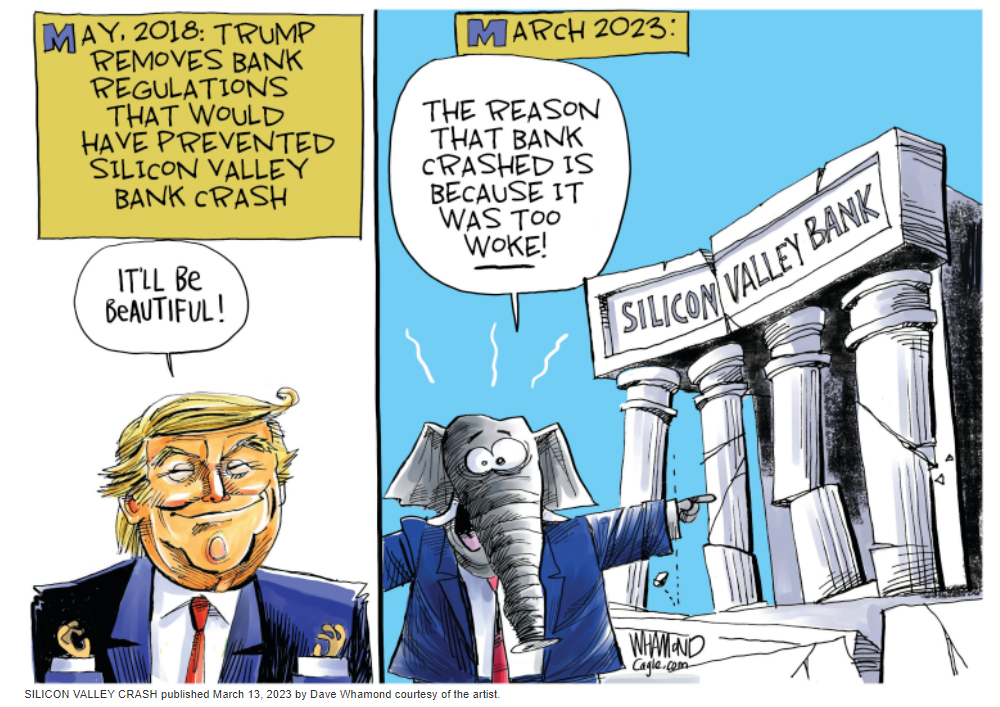The Manhattan grand jury is meeting today, but news stories say the jurors will not be voting on an indictment. So let’s look at something else. How about libertarians and free market ideology?
Quinn Slobodian writes in The Guardian that back in the 1980s, South African libertarians set up a deregulated zone that they sold to the world as “Africa’s Switzerland.” It wasn’t, but I thought this was interesting:
In an interview in 1988, libertarian economist Milton Friedman declared that “a relatively free economy is a necessary condition for a democratic society”. But then he added: “I also believe there is evidence that a democratic society, once established, destroys a free economy.”
Beginning in the 70s, the zone offered an alternative to the messiness of mass democracy, and therefore a way of preventing the destruction of a free economy that Friedman feared. Today the zone also holds out a promise cherished by much of the contemporary political right – that capitalism can exist without democracy.
The success of capitalism without democracy over the last 50 years is best captured in a lens-flared montage of skylines spiked with sparkling skyscrapers. Hong Kong, Singapore, Shenzhen, Shanghai, Dubai: all profited from the suppression or elimination of internal dissent to become vessels for the global flow of mobile capital. They also sparked deep envy among the erstwhile leaders in the global economic race.
The old Cold War era propaganda, of course, was that free market capitalism and democracy were inextricably linked. This was the argument of Friedrich Hayek and his book The Road to Serfdom. I wrote about three years ago,
And this takes us to Friedrich Hayek and his book The Road to Serfdom, first published in 1944, which became a cornerstone of movement conservatism and libertarianism. Hayek was certain that the ultimate evil that would destroy democracy and individual liberty is central planning of the economy. Free markets equal free people. The key to maintaining individual liberty is to support the free exercise of capitalism and markets. Conversely, it was self-evident to conservatives that capitalism and tyranny cannot co-exist, and that if (for example) Communist countries would become more capitalist, individual liberty for their citizens would follow closely behind.
And this was how “free markets” and deregulation of everything and “globalization” and sending manufacturing jobs overseas and everything else that has reduced the American middle class all these years was excused by a lot of people, and not just Republicans. It was all about freedom, you see. Conversely, regulations and anything that got in the way of capitalists making a ton of money was the door to Communism (appropriate musical accompaniment).
I haven’t heard anyone issue dire warnings about the evils of central planning of the economy for a while. I question if anyone, deep down, still buys Hayek’s argument that people stay free as long as they avoid central planning of the economy. And, frankly, I don’t know anyone who advocates central planning of the economy. Or Communism, for that matter. Even so, the “C” word still has power to persuade plenty of under-educated working people in America to keep voting for “freedom,” a word that has lost all coherent meaning in the U.S. today.
Back to Quinn Slobodian at The Guardian:
When Friedman visited the University of Cape Town in 1976, he gave a speech to an audience of 2,000 in which he declared that the market was a much surer route to liberty than democracy; voting by dollars was better than voting by ballots. The key to freedom was not free elections but decentralisation of state power itself. A few years later, South African libertarians followed this line – but with a version of radical capitalism that was entirely dependent on the disciplining (and subsidising) hand of the state. The creation of the Black “homeland” of Ciskei as a would-be libertarian zone in white-ruled South Africa shows how certain kinds of economic freedom depend on political disfranchisement.
Certain kinds of economic freedom depend on political disfranchisement? I wonder what kinds those might be?
The “Black ‘homeland’ of Ciskei” ended up being something between a sweatshop and a prison. The workers had no freedom at all.
The would-be libertarian utopia operated hand in glove with the South African security forces, which punished everyday civilian acts of resistance and actively enforced the prohibition on trade unions. One activist, Priscilla Maxongo, described how women in the labour movement were routinely arrested, interrogated and tortured. She recounted having a rubber tube tied around her neck to cut off her air supply until she divulged information about the groups organising for workers’ rights.
In 1983, police killed 15 protesters when they shot into crowds demonstrating against a bus fare increase. The New York Timescalled Ciskei an “ugly little police state”. Thozamile Gqweta, the secretary of the South African Allied Workers, had his house set on fire with the front door wired shut; his mother and uncle died when their houses were similarly set on fire; his girlfriend was shot by police as they left his mother’s funeral; and he was himself detained for three months and tortured with electric shock. In the same year that the American libertarian magazine Reason celebrated Ciskei as a “haven of prosperity and peace in South Africa’s back yard”, security forces entered a Ciskei church commemorating the 10th anniversary of the Soweto uprising and beat the congregation with whips made of rhinoceros hide, hospitalising 35 and killing a 15-year-old boy.
But, by golly, the investors made a ton of money. Hooray free markets!
Hayek’s ideas may be bunk, but his thinking was a cornerstone of the celebrated “Chicago School of Economics” that has dominated economic policy in the U.S. since at least the 1970s. Milton Friedman was one of its stars. And again, this didn’t just influence Republicans. The neoliberal Democrats bought into this also. America never became Ciskei, but not for lack of trying. And lots of people are still trying. Every time somebody complains about “entitlement programs” making people “unwilling to work,” you see the effort. Something else I wrote three years ago:
It’s gospel to American conservatives that providing citizens safety net benefits — also known as “handouts” — renders them lazy and shiftless and keeps them out of the workforce. In truth, the lack of supports such as paid sick leave, health care, and child care probably hampers productivity far more than the welfare recipients of Republican fantasy who are somehow enjoying carefree lives on government checks.
But keeping workers helpless and desperate makes them more compliant, you see.
Skip to a recent post from Robert Reich, What connects Trump’s likely arrest with the bank bailouts?
Start with multi-billionaire Peter Thiel, and follow the money.
You may recall that in 2016, Thiel spoke at the Republican National Convention to make the case for why Trump should be the next president of the United States.
In the midterm elections of 2022, Thiel donated $15 million to the Republican Ohio senatorial primary campaign of JD Vance, who alleged that the 2020 election was stolen and that Biden’s immigration policy meant “more Democrat voters pouring into this country.”
Thiel also donated at least $10 million to the Arizona Republican Senate primary race of Blake Masters, who also claimed Trump won the 2020 election and who admires Lee Kuan Yew, the authoritarian founder of modern Singapore.
Masters lost. But thanks to Thiel’s munificence, Vance is now in the U.S. Senate.
Thiel and other wealthy self-described “libertarians” want Trump to be re-elected president in 2024. I’ll get to the reason in a moment.
And, of course, Thiel had millions in Silicon Valley Bank. Further on in the same essay, Reich writes,
Thiel is part of the anti-democracy movement, of which Trump is the informal leader.
Their antipathy to democracy comes from the same fear that the extremely wealthy have always harbored about democracy — that a majority could vote to take away their money. That fear has been heightened by the fact that more and more of the nation’s wealth is going to the top, combined with demographic trends showing the majority of voters becoming less economically secure, more non-white, and politically left.
Thiel and his ilk see in Trump an authoritarian strongman who won’t allow a majority to take away their wealth. In December 2017, Trump and his Republican allies in Congress engineered a giant tax cut for the super-rich and the companies in which they invest. Many believe that a second Trump administration, backed by a Republican Congress, will cut their taxes even further. …
… A few years ago, Thiel wrote that “I no longer believe that freedom and democracy are compatible.” Presumably he was referring to the freedom of oligarchs like himself to be unconstrained by taxes and regulations. In this narrow sense, he’s correct: Oligarchy is incompatible with democracy. Nor is oligarchy compatible with the freedom of the rest of us.
Thiel and others like him want to return to an era when American oligarchs had freer reign. In that same essay, Thiel wrote:
The 1920s were the last decade in American history during which one could be genuinely optimistic about politics. Since 1920, the vast increase in welfare beneficiaries and the extension of the franchise to women — two constituencies that are notoriously tough for libertarians — have rendered the notion of “capitalist democracy” into an oxymoron.
But if “capitalist democracy” has become an oxymoron, it’s not due to excessive public assistance or because women got the right to vote. It’s because billionaire capitalists like Thiel are undermining democracy with giant campaign donations to authoritarian candidates.
We’re not going to get the nation back on track until the libertarian/free market crowd is pushed to the fringes of the fringe. As long as they still have power to persuade Americans that deprivation, hardship, and disenfranchisement is “freedom,” the nation will suffer.
Update: Related — see Paul Waldman, Don’t be fooled by the GOP crusade against ‘woke Wall Street’.




